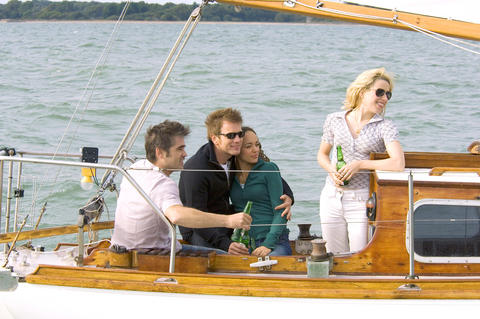Cassandra's Dream, Woody Allen's latest excursion to the dark side of human nature, is good enough that you may wonder why he doesn't just stop making comedies once and for all. Perhaps that's heretical, but it's the view of someone who has accompanied Allen on all his recent follies, The Curse of the Jade Scorpion included, and has too often heard her own laughter die gurgling in her throat from a lack of inspiration. There's nothing remotely funny about Cassandra's Dream, save perhaps that immodest title.
As with his last two films, Match Point and Scoop, Cassandra's Dream takes place in a movie-made London where the picturesque streets can turn into noirish dead ends. A well-matched Ewan McGregor and Colin Farrell play Ian and Terry, brothers in blood and deed. Somewhat flash, with natty suits and a jaunty walk, Ian helps run their father's struggling restaurant; Terry, in turn, works in a garage where the grease creeps under his nails and stays there. Ian dreams of making it big in real estate, while Terry banks on the dog races and the poker table. They're good boys, nice guys, eager to please, fast to smile and as dedicated to each other as to the idea of family.
That idea is put to the cruel test when each brother exceeds his grasp - Ian by sleeping outside his class, Terry by losing large at cards - and both turn to their elusive, wealthy uncle for help. Dropped clumsily into the drama, Uncle Howard (Tom Wilkinson) is a classic deus ex machina who exists simply to push Terry and Ian toward their fates. He doesn't make much sense (he swings into London abruptly), but he doesn't have to; he just has to provide the means for two ordinary men to transform into tragic characters. It's an old story and it fits Allen's pessimism nicely, in part because it's the kind of old story that predates the modern condition and the therapeutic jabber of which he has been so fond.

PHOTO: COURTESY OF SERENITY
Cassandra's Dream owes more to Oedipus Rex than to the Oedipus complex (and something to Claude Chabrol), which doesn't mean that you can't put Ian and Terry on the couch. By all means, do. But the pleasures of this modest film are right on the surface, in the upward curve of McGregor's lips and the reverse lines of Farrell's anguish. Like Allen's instrumental visual style, McGregor's easygoing turn takes time getting used to, partly because, as is almost always the case with this director, the actor seems to have been left to his own devices. But the performance sticks like a knife. It delivers force and feeling, as does Farrell, whose gentleness is seldom used well.
The rest of the cast fares less well, including Wilkinson, who never finds the right pitch for his character or the monstrous fury that his most pivotal scene demands. Allen sets this scene during a rainstorm, which echoes the similarly climactic moment in Match Point, when the secret lovers kiss and set destiny on its brutal path.

On April 26, The Lancet published a letter from two doctors at Taichung-based China Medical University Hospital (CMUH) warning that “Taiwan’s Health Care System is on the Brink of Collapse.” The authors said that “Years of policy inaction and mismanagement of resources have led to the National Health Insurance system operating under unsustainable conditions.” The pushback was immediate. Errors in the paper were quickly identified and publicized, to discredit the authors (the hospital apologized). CNA reported that CMUH said the letter described Taiwan in 2021 as having 62 nurses per 10,000 people, when the correct number was 78 nurses per 10,000

As we live longer, our risk of cognitive impairment is increasing. How can we delay the onset of symptoms? Do we have to give up every indulgence or can small changes make a difference? We asked neurologists for tips on how to keep our brains healthy for life. TAKE CARE OF YOUR HEALTH “All of the sensible things that apply to bodily health apply to brain health,” says Suzanne O’Sullivan, a consultant in neurology at the National Hospital for Neurology and Neurosurgery in London, and the author of The Age of Diagnosis. “When you’re 20, you can get away with absolute

May 5 to May 11 What started out as friction between Taiwanese students at Taichung First High School and a Japanese head cook escalated dramatically over the first two weeks of May 1927. It began on April 30 when the cook’s wife knew that lotus starch used in that night’s dinner had rat feces in it, but failed to inform staff until the meal was already prepared. The students believed that her silence was intentional, and filed a complaint. The school’s Japanese administrators sided with the cook’s family, dismissing the students as troublemakers and clamping down on their freedoms — with

As Donald Trump’s executive order in March led to the shuttering of Voice of America (VOA) — the global broadcaster whose roots date back to the fight against Nazi propaganda — he quickly attracted support from figures not used to aligning themselves with any US administration. Trump had ordered the US Agency for Global Media, the federal agency that funds VOA and other groups promoting independent journalism overseas, to be “eliminated to the maximum extent consistent with applicable law.” The decision suddenly halted programming in 49 languages to more than 425 million people. In Moscow, Margarita Simonyan, the hardline editor-in-chief of the